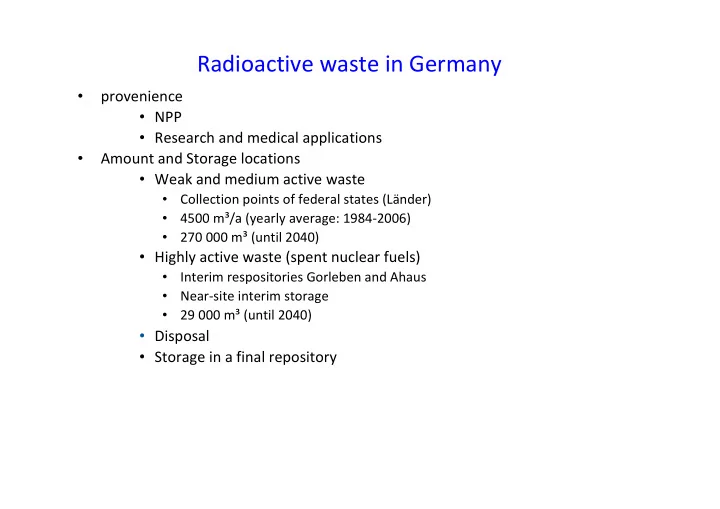

Radioactive waste in Germany provenience • • NPP • Research and medical applications Amount and Storage locations • • Weak and medium active waste Collection points of federal states (Länder) • 4500 m³/a (yearly average: 1984 ‐ 2006) • 270 000 m³ (until 2040) • • Highly active waste (spent nuclear fuels) Interim respositories Gorleben and Ahaus • Near ‐ site interim storage • 29 000 m³ (until 2040) • • Disposal • Storage in a final repository
Schematic sketch of a waste repository
Long term safety assessment Retention of radio ‐ nuclides • • Waste matrix • Filling material and technical barriers • Host rock • overburden Transport in ground water • Interfaces with the biosphere • • Rise of contaminated water • Well • Flow into surface waters Use of contaminated resources • • Soil • Water Assessment of potential radiation exposure occurring very late in time • • Boundary conditions?
Interfaces for Radio ‐ nuclides to the biosphere
Potential contamination processes for the considered interfaces
Two paths of climate change Marrakesh (MAR) BS Roma (I) Csa Humid path Vallodolid (S) Csb Rostov (RUS) Dfa Cfb Dry path Turku (F) Dfb Vardo (NO) Sodankyla (F) ET Dfc
Vardo Sodankyla Turku Magdeburg Rostow Vallodolid Rom Marakesch
Average monthly air temperature (°C) for the analogue stations
Average monthly precipitation(mm) for the analogue stations
ECOLEGO – Simulation Modelling and Risk Assessment Software
Recommend
More recommend